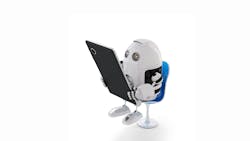AI dental receptionists: Hype, reality, and how to build one yourself
In recent months, AI receptionists have been popping up all over the dental industry. These tools promise to revolutionize the way dental practices manage their calls and customer service, offering everything from appointment scheduling to answering patient questions.
Many AI receptionist companies are marketing these services to dentists, promising cutting-edge technology that will transform the way you handle patient calls and communication. On the surface, it sounds incredibly attractive—automated appointment scheduling, patient inquiries handled with ease, and more.
But here’s the catch: most of these services don’t offer anything you can’t already access yourself. They rely on basic, off-the-shelf AI tools that cost just a fraction of what they’re selling them for. These companies purchase simple AI technology for as little as $10–$20 per month and then mark up the price when selling to dental offices, often charging anywhere from $300 to $500 or more per month.
Now, if you're looking to simply outsource the work for convenience, sure, it may make sense to invest in a ready-made solution. But if you're interested in keeping your costs down and taking control of the process, the reality is that you can build your own AI with very little technical knowledge, in very little time, for very little cost. We'll show you how.
But first, let’s break down the hype of these AI systems to help you make a more informed decision.
The hype: AI receptionists will revolutionize your practice
AI phone agents are the latest trend in every industry, with countless companies emerging in the last year promising this groundbreaking technology. If you’ve tried a demo, you probably had the same initial reaction many dentists do:
"Wow, this actually sounds like a real person!"
It responds quickly and seems knowledgeable and professional. You can interrupt it, and it keeps going without missing a beat. At first, it seems to outperform a human receptionist in some ways, working 24/7, handling calls without fail, and costing far less than a salary. It’s easy to see why many dentists get excited.
Many dive in, believing they’re getting ahead of their competition. The AI might have a few bugs at first, but the company promises fixes with some fine-tuning.
But after a few months, the excitement fades. Instead of streamlining the front desk, the AI begins to feel more like a burden. A quick browse of online dental forums turns up disappointed dentists voicing their frustrations, often going back to the old answering machine.The technology isn’t necessarily bad, but its limitations are often misunderstood, and the initial excitement tends to fade.
For example, many AI systems claim they can directly schedule appointments into your PMS. In reality, the best they can do is send an email or text to your staff, who will then have to enter the data manually. Worse, these systems often promise patients appointment slots that don’t actually align with the practice’s availability, forcing your staff to step in and disappoint patients by explaining why the AI-suggested appointment can’t be booked.
Practical use cases: Where AI receptionists shine
While AI receptionists can’t replace your front desk staff, they can be incredibly useful in certain areas. Let’s look at the practical applications where these systems truly shine:
After-hours calls
One of the most valuable uses of AI receptionists is handling calls outside regular office hours. Instead of letting patients go to voicemail, the AI can answer the phone, take messages, and even provide basic information. This ensures that no calls go unanswered, but it also helps prevent missed opportunities especially for high-ticket services like dental implants, Invisalign, etc.
The AI could send your staff a detailed breakdown of each call, including the reason for the inquiry, and can organize calls by priority. For example, if a patient is calling to ask about dental implants or other high-value cosmetic services, the AI can flag this as a high-priority patient. Your staff can then follow up promptly the next day to discuss treatment options and schedule consultations.
Overflow and busy times
A very high percentage of patients who reach voicemail simply abandon the call instead of leaving a message. We know this because our software analyzes tens of thousands of calls every month for dental practices across North America. These missed opportunities can be a significant loss for your practice, as many of these patients will not call back.
This is where an AI receptionist can make a difference. Instead of routing calls to voicemail, the AI can immediately pick up and inform the patient that the receptionist is busy assisting another patient but will follow up shortly. During this brief interaction, the AI can gather important details, such as the patient's reason for calling, contact information, and any specific concerns.
By capturing this data, the AI ensures that patients don’t feel ignored and keeps them engaged, making it easier for your team to follow up when they become available.
Patient follow-up/appointment confirmations
AI can be a useful tool for confirming patient appointments. It can automatically reach out to patients ahead of their scheduled visits to confirm their attendance, reducing no-shows and keeping your schedule organized. While it doesn't replace personal interaction, it helps free up your staff from manual follow-ups, allowing them to focus on more complex tasks. This ensures your practice remains efficient and appointments are kept on track.
How to build your own AI dental receptionist
If you're comfortable navigating Netflix, using Excel, or setting up a smartphone, you already have the technical skills needed to build your own AI dental receptionist. Nick from RevUp Dental demonstrated exactly how simple and straightforward this process can be using Retell AI.
In fact, it takes under an hour to go from zero to a fully functional AI agent capable of handling calls, taking messages, and even collecting basic patient information.
Here’s a video on how to do it, step by step: How to Build an AI Dental Receptionist
If you need an off-the-shelf prompt to use as a foundation, here is the one used in the video. This prompt serves as the perfect starting point, allowing you to tweak the AI's responses and functionality based on your specific requirements.
Take it further: let your AI confirm appointments
Now that you've learned how to build your own AI receptionist and seen just how easy and affordable it is to get started, it’s time to put that AI to work.
One of the most practical ways to use your new virtual assistant is for automating patient appointment confirmations. This not only helps reduce no-shows, but also frees up your team from repetitive follow-up calls and manual texts.
In this second video, we’ll walk you through how to set up confirmation workflows using the same tools from the first tutorial: https://youtu.be/ZMKPXrlHmK0?si=V-g4x3bhDeIY6FFx
Conclusion
AI dental receptionists have significant potential to increase the production of your practice. However, it’s essential to approach them with realistic expectations.
While they aren’t a replacement for your human receptionist, they can offer valuable assistance in managing after-hours calls, handling overflow, confirming appointments, and streamlining routine patient interactions.
The key takeaway is that, despite their limitations, when used in the right areas, AI receptionists can be a highly effective tool for enhancing your practice's operations and improving overall patient satisfaction.
Editor's note: This article originally appeared in DE Weekend, the newsletter that will elevate your Sunday mornings with practical and innovative practice management and clinical content from experts across the field. Subscribe here.
About the Author

Nick Fotache, Founder of RevUp Dental
Nick Fotache is the founder of RevUp Dental, a digital marketing agency that uses data-driven insights and AI-powered solutions to help dental practices acquire more new patients. If you'd like to learn more about how RevUp can help your practice, please book a demo on the company page.


